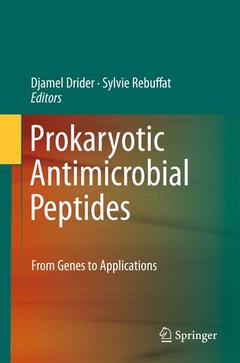Prokaryotic Antimicrobial Peptides, 2011 From Genes to Applications
Coordonnateurs : Drider Djamel, Rebuffat Sylvie

The book will provide an overview of the advancement of fundamental knowledge and applications of antimicrobial peptides in biomedical, agricultural, veterinary, food, and cosmetic products. Antimicrobial peptides stand as potentially great alternatives to current antibiotics, and most research in this newly-created area has been published in journals and other periodicals. It is the editors? opinion that it is timely to sum up the most important achievements in the field and provide the scientific community in a reference book. The goals of this project include illustrating the achievements made so far, debating the state of the art, and drawing new perspectives.
Dr. Djamel Drider is currently an associate professor of Microbiology at Nantes-Atlantic National College of Veterinary Medicine, Food Science and Engineering-ONIRIS. He obtained his PhD from Ecole Nationale Supérieure Agronomique de Montpellier (France) and completed his post-doc at Centro de Investigaciones Biológicas (Madrid, Spain) and Mount Sinai School of Medicine at New York University. Dr. Drider is currently a member of the editorial board of the journal, Probiotics and Antimicrobial Proteins and Chairman of the French Antimicrobial Peptides Society.
Professor Sylvie Rebuffat is the Director of the Laboratory Communication Molecules and Adaptation of Microorganisms at the National Museum of Natural History in Paris, France. She researches antimicrobial peptides of bacterial origin (microcins, bacteriocins), focusing mainly on their mechanisms of action, structure/activity relationships, and biosynthetic pathways. Dr. Rebuffat is also the Scientific Advisor to the Director of the National Museum of Natural History.
Ouvrage de 451 p.
15.5x23.5 cm
Date de parution : 03-2011
Ouvrage de 451 p.
15.5x23.5 cm
Disponible chez l'éditeur (délai d'approvisionnement : 15 jours).
Prix indicatif 158,24 €
Ajouter au panier


